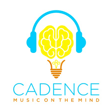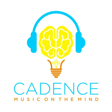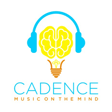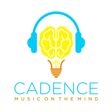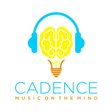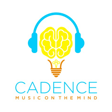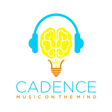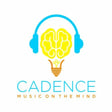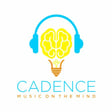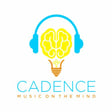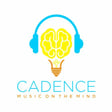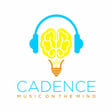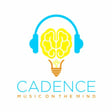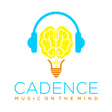Become a Creator today!Start creating today - Share your story with the world!
Start for free
00:00:00
00:00:01

Episode 04: What Is Music For?
We take a step back from neuroscience and psychology to listen to what artists have to say about what music is for.
Transcript
Introduction to Cadence Podcast
00:00:05
Speaker
Welcome back to Cadence, a podcast exploring what music can tell us about the mind. I'm your host, Indre Viscontes.
00:00:13
Speaker
In the last few episodes, I've been trying to pin down a definition of music, then what might be common across all music genres, and most recently, I started to ask the question of how we extract meaning from music. That kind of gets at the question of what is music for?
Exploring Music's Meaning Across Disciplines
00:00:29
Speaker
I've been talking to musicologists and neuroscientists, and even a patient who is learning to hear music.
00:00:35
Speaker
But there is still so much to explore, particularly when it comes to the question of the meaning of music and how we interpret it. Sometimes it's a little bit frustrating for me because this is a big question, but it's one I feel that we need to answer layer by layer.
Music's Evolutionary Roots: From Darwin to Birds
00:01:01
Speaker
Even though it seems sometimes that we haven't made much progress, that artists have a much better understanding of what music is good for than scientists do, scientists still have been fascinated by music for at least 150 years. Even Darwin had his own theory of the purpose of music.
00:01:19
Speaker
In 1871 he wrote, It appears probable that the progenitors of man, either the males or females, or both sexes, before acquiring the power of expressing their mutual love in articulate language, endeavour to charm each other with musical notes and rhythm.
00:01:37
Speaker
In Darwin's view, music in humans evolved in response to sexual selection, just like it did in songbirds. How birds use music to attract mates is fascinating. We'll definitely explore that subject in a different episode. You see, in some species, the more creative their songs, the more likely the artists snag mates. It's almost like a bird version of creativity. Here's what a dad zebra finch sounds like when he's teaching his sons to woo the ladies. And here are a few of his sons getting creative.
00:02:12
Speaker
Good luck, boys. We'll come back to you in a future episode.
Theories on Music's Evolutionary Purpose
00:02:15
Speaker
By the way, those sounds come from Heather Williams' Zebra Fidge song archive at Williams College. But back to Darwin's idea that music is all about sex, even in humans. Now proponents of this view point to the apparent sexual attractiveness of rock stars like Jimi Hendrix.
00:02:31
Speaker
Although, I've noticed that often these examples are exclusively male, and we seem to ignore female sexually attractive musicians like Beyonce or Madonna. Here, too, they have a friend in Darwin. The impassioned orator barred all musician when, with his varied tones and cadences, he excites the strongest emotions in his hearers. Little suspects that he uses the same means by which his half-human ancestors
00:02:58
Speaker
long ago aroused each other's ardent passions during their courtship and rivalry. Music is complex, but it's not clear how it benefits survival, except perhaps by making someone more sexually attractive. And that's what prompts thinkers like Steven Pinker to call it auditory cheesecake.
00:03:15
Speaker
He writes in How the Mind Works, But people like Jeffrey Miller at University College London insist that the principal biological function of music is sexual courtship.
00:03:33
Speaker
Still, others suggest that music evolved when we needed to coordinate our actions, like in a work setting. So, for example, if I need to move a big rock, and I need your help, and I can't just ask you because I haven't evolved the ability to speak yet, I might gesture to you and say something like, oh, oh, oh, oh. And then you know it's time on that fourth beat to move the big rock together. Thanks to Nick Germanikos for that example.
Universal Presence of Song in Cultures
00:04:01
Speaker
And indeed, singing in work settings is extremely common in many cultures. From military songs, to fieldwork songs, to songs sung by cowboys and sailors. As musicologist Nicholas Matthew explains,
00:04:27
Speaker
It seems pretty clear that every culture has something like song. Not that anyone could say exactly what song is, but that every culture has something that we would be inclined to describe as song or song-like. And what song is, in part, is a heightening of vocal or verbal expression.
00:04:49
Speaker
and that's partly why we find song in particular spaces and places we find it for example where people are working that song encourages a particular kind of bodily comportment or a particular kind of focus we encourage it where people are doing ritualistic or religious things you know it's one thing to speak a prayer and quite another to sing it I don't think it's for nothing that there's a history of
00:05:16
Speaker
understanding song has been continuous with rhetoric or oratory or somehow some primal version of speech that is closer to some sort of originary expression very often we see priests singing or indeed the first musical notation or what we could understand as
00:05:40
Speaker
belonging to this class of strange scribbles called musical notation that one encounters in the West from about the 9th century, is inevitably associated with church services. Little squiggles that remind people of how to sing very important bits of playing chart in particular moments in the liturgical calendar.
00:06:04
Speaker
And of course the other place you find very early notation in the secular context is in love songs. Which is the other place where we want hiking rhetorical delivery when we want to express erotic attachment or a kind of excessive feeling that spills over into a different kind of vocalities.
00:06:40
Speaker
And we see there a lineage right from Troubadours, you know, through Marvin Gaye, I mean, where a heightened, fractured, almost strange kind of rhetorical vocal delivery is the sign of a particular kind of extreme eroticism, you know, particularly among guys.
00:07:00
Speaker
Now we're getting back
Music's Role in Film: Perspectives from Artists
00:07:01
Speaker
to Darwin and sexual selection. So for this episode, I wanted to take a step back from neuroscience and psychology for a minute and listen to what artists have to say about what music is for. Because after all, they use it purposefully all the time. One of the most common purposeful uses of music is in film.
00:07:19
Speaker
So I wanted to talk to a film director about the process of choosing music and layering it on to create a particular experience for the person who goes to see the film. So I sat down with a friend of mine, Jonathan Lin, director of films like My Cousin Vinny. It's either where the leather jacket, which I know you hate, or this. So I wore this.
00:07:44
Speaker
ridiculous thing for you. The fighting temptations. He wrote and directed the cult classic Clue. And he's also the co-creator and writer of a very successful television series, Yes Minister and Yes Prime Minister. Oh, and he's also a playwright and wears a number of other hats.
00:08:02
Speaker
So I asked Jonathan to tell me about how music is used by film directors. What's the process of selecting and attaching it to a film, since it can make or break a cinematic experience? How much time do they spend solving this problem? Music is often used in films that are called suspense films or thrillers to create a mood. Generally speaking, in my opinion, it should only be used when the mood is not created by the action.
00:08:31
Speaker
In Hitchcock's finest films, the greatest suspense sequences have no music because the story itself is full of suspense and tension. Music for most films is a way of filling a gap that the scenario or the performances have not adequately filled.
00:08:57
Speaker
So, for instance, you use music to make a scene motor along faster. A scene that would be rather boring, somebody coming out of a building, getting into their car, driving away. It's essential for the story, perhaps, but it's pretty dull to look at, no matter how you photograph it. If you add music, it gives it energy. Suspense music is good when you've got a suspense sequence that unfortunately lacks.
00:09:22
Speaker
suspense that it tells the audience. Romantic music is good, although very out of fashion, and that it helps create romance, where otherwise the film may not be fully succeeding in doing so. You know, when things are lots of famous film songs, you know, Breakfast at Tiffany's had
00:09:46
Speaker
Billy Wilder used romantic music a lot. The apartment has a lovely theme to it, which creates sadness and romance simultaneously. Henry Mancini was very good at this. There are a lot of composers who are good at this. But Jonathan also pointed out that music in film has a dark side.
00:10:02
Speaker
Music is very dangerous as a means of achieving comedy. You can't allow the music to say, this is a funny scene. Because if you do that, it will almost invariably kill whatever comedy is in the scene. It's what old vaudeville entertainers called bananas on bananas. You don't need to say, here's, I'm going to do a joke. Here's a joke. Look, we're doing a joke. Wasn't that funny? That's what the music is saying. If you're putting music into a funny scene.
00:10:32
Speaker
What else do you use music for? Well, you use it for source music. That's S-O-U-R-C-E. In films and in plays, it tells you a period. If you're in the 1930s, you might play a 1930s tune on the radio, or you might hear a band playing it.
00:10:51
Speaker
If, as in the Glass Menagerie, when the young couple are sitting on the fire escape and wondering essentially if Laura is going to have a date with the gentleman caller, you hear music from a dance band across the street. So that kind of music is extremely helpful because it can be evocative and create a time and a place which you otherwise might not be using fully.
00:11:19
Speaker
So as you're going through a script and you're reading it for the first time, whether it's a play or a film, is it immediately obvious to you where you're going to need music or do you feel like you go through a first kind of draft in your head of how you're going to stage it or how you're going to film it and then you see where the music will be necessary?
00:11:37
Speaker
There's no rule for that. Sometimes it's apparent from the beginning where you're going to need music. It depends again on the style of the film. I made a film called My Cousin Vinny, which is full of southern sounding music. And all of that was arrived at when we'd done a first cut of the movie.
00:11:59
Speaker
And in the three or four weeks between finishing my first cut and showing it to the studio, I tried out lots of what they call temp music, temporary music that you find from other soundtracks, and discovered the kind of style that I wanted, and then talked to my composer about it, and he eventually wrote music that had a sort of mood of the Deep South about it. And then there was a scene at the end when Vinnie wins the case, you have triumphant music. In light of Miss Vito's and Mr. Wilbur's testimony,
00:12:29
Speaker
The state like dismiss all charges. So music is notoriously hard to describe using words. So let's say you have a particular scene. Let's stick with my cousin Vinny and you have a particular sound. Do you show or play for the composer music that you think is in the right kind of sound or do you feel like that will influence the composer too much and sort of stifle their creativity?
00:12:57
Speaker
Yes. In other words, yes, you do sometimes have to say this is the kind of thing I think we want.
00:13:04
Speaker
and hope that they will do something that does the same thing in their own voice. Sometimes you say, I'm not really sure what we need here, so what do you think? Sometimes I say, because I'm old-fashioned, I say, I think we need a really good melody here. A melody is really out of fashion in film scoring for reasons that I
Challenges in Modern Film Scoring
00:13:31
Speaker
simply don't understand.
00:13:32
Speaker
There are so many great films calls of the past. Can you imagine The Godfather without those tunes? There are so many films where the music is melodious and wonderful, and now it's out of fashion. I don't know whether it's because composers are now people who are good at orchestrating but don't have a gift for melody, or whether they've been ordered not to write melodies by a great many directors and producers.
00:13:58
Speaker
But it's a struggle now. When you say to composers, I want a melody here and it's going to be adaptable and it's got to be brief enough that it can be introduced into short scenes and interesting enough that it can be expanded for big scenes. I think that's important. I was also curious to hear how the process of adding music to film has changed over the years. After all, these days you can get high quality samples of virtually every instrument in an orchestra, which is way cheaper than hiring good musicians.
00:14:27
Speaker
When I made my first film, which was called Clue, which was in 1984, there weren't any synthesizers. There wasn't any electronic music. There wasn't any sampling. So what happened was John Morris, who was a really good composer, who I picked because he'd done a lot of Mel Brooks films and I thought he would understand the lunacy that was involved in Clue.
00:14:49
Speaker
he played me a score on a piano, the way composers traditionally have done for a couple of hundred years. And then we talked it through and I said, that's a really good tune and that really works. How are you orchestrating that? And he said, well, I thought we'd have flutes here and such and such and the oboes and then this would all be strings. And so you talk it through like, you know, as if it's a real thing.
00:15:13
Speaker
Um, but you have to imagine it and you never heard it until you heard it at the, what they call the scoring session, which is the recording session. And then you hoped it would be all right. Um, but you had to, that was a really tense day because although it was wonderful to hear the music, if it wasn't right, that was the first time you saw it orchestrated with the picture. So that was your moment when you had to step in and say, wait a minute. And I really think we have to get rid of the flutes here.
00:15:39
Speaker
So wait a minute, so this is the recording session and they're actually playing the film while the... Wow, what has described that room for us? It's a big screen. The composer who's frequently the conductor, but not always, is on the podium wearing headphones. He can hear the dialogue.
00:15:57
Speaker
The orchestra is facing away from the screen, so they're not distracted. They're facing the composer-conductor, and he has to make the music fit very precisely to the nearest frame, essentially, 24 frames a second, to the nearest frame we'll do. He has to make the music that he's written fit. He has to play it in the perfect time. Now, obviously there's music editing afterwards, and you can make adjustments, but essentially that's the process.
00:16:24
Speaker
All of that's changed because now, even if you want a string section, a lot of people simulate it with computers. Computers can sound very electronic and unlike an orchestra, but they can also sound fairly like real musicians playing real instruments. Generally speaking now, scores are put together, or in my films I found my composers are put together scores piece by piece the way
00:16:50
Speaker
pop records are made, not the way symphony orchestras are recorded. So what they do is they get in, you know, a few of the frontline musicians, they get in, you know, the tenor saxophone and the trumpeter and the trombonist or whatever. If there's a multiple trumpet part, one trumpeter just plays them all. They're all recorded over and then placed together later. And then on another day you have the string section. That would be a big day because there's so many musicians.
00:17:18
Speaker
And that would be in a big studio. The other stuff is likely to be in a kind of a smallish room of the sort that pop musicians record their songs in because you're recording essentially one instrument at a time. And so it's all done piecemeal and you don't know what it sounds like till you hear it all put together. Before you get to that process, nowadays with computers,
00:17:42
Speaker
Composers can simulate the score, even if they don't have any musicians at all except the computer. They can simulate what the score is going to sound like, and you can hear roughly what it's going to sound like. It's just the quality won't be so good. The instruments won't be exactly right.
00:17:58
Speaker
but they can now play you the score they can say this is what i think we'll do for q forty one here you know on the car chase here and she's running down the street and you know down the flight of stairs the cars chasing and here comes the motorcycle and there's the drone and blah blah blah and then we're playing this and they and they play it for you.
00:18:17
Speaker
And then you say, okay, and then you react, but it's easier to react that way because you haven't got 100 musicians sitting around wondering what's going to happen next at, you know, a million dollars a minute. So from that point of view, it's, it's easier nowadays, but it's, it's not the same experience as a live orchestra.
00:18:40
Speaker
I wanted to get the composer's perspective about sound sampling versus using live musicians. So I talked to music historian and composer Robert Greenberg. He's recorded over 600 lectures for the great courses on all different aspects of music. And he's also composed over 50 works for a wide variety of instrumental and vocal ensembles.
00:19:03
Speaker
I asked him what he thinks about the fact that there are now samples of musicians available to composers that sound almost indistinguishable from live performers. There's so much to say here.
Live Musicians vs. Digital Sampling in Film
00:19:12
Speaker
You know, when I was studying electronic music back in the late seventies, early eighties, we weren't sampling. We were creating our own blips and blabs on electronic sounds because that's what electronic music was then. Now, digital music is all about sampling instruments and basically imitating instruments
00:19:32
Speaker
Because the instruments themselves are not going to play our music. I mean, I'd love to write for orchestra. I've written two piano concertos. The last one I wrote was for Mac McRae. It was performed by the Conservatory Orchestra in 2000. And it went great. They loved it. Mac loved it. The press loved it. I mean, it was one of the great experiences of my life. Have I been asked to write another orchestral piece since then? No. And I'm 63, or almost 63, and I don't expect ever to be asked.
00:19:59
Speaker
So, if I'm going to get some pleasure at a writing for orchestra, it's going to have to be electronically. The problem is, you're not a really good composer, and I believe this completely, unless you can write for live people. And here's why. I was talking before, arrogantly, conceitedly, about how I could identify whether a piece was written by a computer. I can also tell you, 99% of the time, if a piece of music was written by someone on a computer,
00:20:28
Speaker
and sampled, because there's dead giveaways. The dead giveaways, for example, are that there's no places for the wind instruments to breathe. There's no moment when the strings can transition from pizzicato back to Arco.
00:20:42
Speaker
you have to give them a few beats to stop plucking and to start bowing again. The music doesn't breathe because you can pile in more and more and more. You can pile in a level of detail that's almost impossible to play in real time. You can jack up the tempo to the point that no person, not even Glenn Gould on steroids and methamphetamines could possibly do.
00:21:04
Speaker
So there you go, you can compose a string quartet for a very good sampling program. Does it breathe? Does it sound like four people talking to each other? Because that's what a string quartet is. It's four people chatting and arguing and smiling at each other.
00:21:24
Speaker
Does it mean we're going to have to redefine these genres? Well, maybe. So we'll see. In 100 years, we'll see. Maybe these issues will have been tiredly left behind because everyone is working electronically. But I don't think so. Our digital revolution is, what, 20 years old, 25 years old?
00:21:44
Speaker
We've been evolving as homo sapiens, we've been evolving for about 200,000 years. Okay, it's going to take more than 15 years, more than 20 years to overcome the instincts that have been bred into us by selection. And those instincts are to do things communally, to work as a group, because we are better as a group than we are as individuals.
00:22:08
Speaker
So we'll see. But to your question, no. It has to be able to be played and sung by real people. If it can't, it's not instrumental music. It's just electronic music.
00:22:39
Speaker
Well, that gets us back to our original conversation of why music evolved and this idea that music brings us together, whether it's to make us more productive and better workers or to make more babies. So maybe we're not quite ready to get rid of performers just yet. But one thing I've always wondered is how directors choose a particular musical piece. Does Jonathan know exactly what he wants to hear and just needs a technician to provide it? I asked him about his process of choosing music.
00:23:08
Speaker
I mostly hear it in my head. I think, oh, I know what I want there. Where do ideas come from? Nobody knows the answer to that question. But I get an idea. I've listened to music all my life. But sometimes, if I want something ethereal or something, I mean, I had to long think about music that I wanted to underscore certain speeches, which were tragic speeches about what was going on in the trenches in World War I. I didn't use them all in the end in the play.
00:23:35
Speaker
But in the end, I used Richard Strauss from Alsos Brax, Zarathustra, and from a couple of his other pieces. And I laboriously went through discs and listened and found precise places where the music, I thought, would not fight the dialogue, would enhance it. And I liked it because it was melodic.
00:23:59
Speaker
sentimental in a way that I thought was oversentimental. And then sometimes not melodic when you don't want melody because that will find the rhythm of the dialogue. One of the problems with using music under dialogue is that the music can come to dominate
00:24:17
Speaker
the rhythm of the scene, and that's all right if you want the music to dominate the rhythm of the scene, but it's not all right if you want the dialogue to. For instance, when I did A Folk on Nuns on the Run, George Harrison was the executive producer, and in fact, the financier of the film, it was his money that got the film made.
00:24:34
Speaker
And his manager said to him, George, you got to write a song for the movie. And George didn't want to. And actually, I didn't want him to. I was a huge fan, but we didn't particularly need, we didn't have a space for a George Harrison song. However, he was very nice.
00:24:49
Speaker
And he turned up at the cutting room one day with a boombox and a cassette and said, I've written this song. Do you want to hear it for the film? So we said, well, yeah, cool. He was a beetle. And so we played the song and it was really good.
00:25:06
Speaker
So he said, do you want to use it? I said, I'll have to get back to you. So this was a lengthy process because in those days you had to transfer the song to magnetic tape and then play it on a machine that was called a CAM, which was a way in which you played film and sound together because nothing was computerized. So we put the music, we got it onto the magnetic tape, we put it up against the scene and it destroyed the scene.
00:25:36
Speaker
because the song was too interesting and the scene, and it dominated something quite subtle that was going on on the screen. So I had to phone George and say, who was both the financial of the film and George Harrison and say, so anyway, I got him on the phone and he said, somebody said he's having dinner. I said, I've got to speak to him because we had a preview coming up.
00:26:04
Speaker
So he came to the phone and I said, George, I really loved your song, but I tried it against the scene and it doesn't work. And he said, oh, well, that's all right. It's not compulsory. So I said, oh, good. And he said, can I go back to me dinner now?
00:26:24
Speaker
Thank you for listening to this episode of Cadence. We'll continue our conversation about what music can tell us about the mind in future episodes. You can find us online at the ensembleproject.com slash cadence on Facebook at Facebook slash cadence podcast.
00:26:39
Speaker
and on Twitter, at Cadence Podcast. You can also get in touch with us at cadencemind at gmail.com. Cadence is produced by Adam Isaac and me, Indre Viscontis. I also created and write the show. The music in this episode was provided for us by acclaimed New Zealand composer, Rian Sheehan.
00:26:56
Speaker
Check him out at reinchian.com. You can find me on Twitter at IndreViz. Cadence is generously supported by the Germanicos Foundation. Join us in two weeks for our next episode in which we continue our exploration of what music tells us about the mind.
